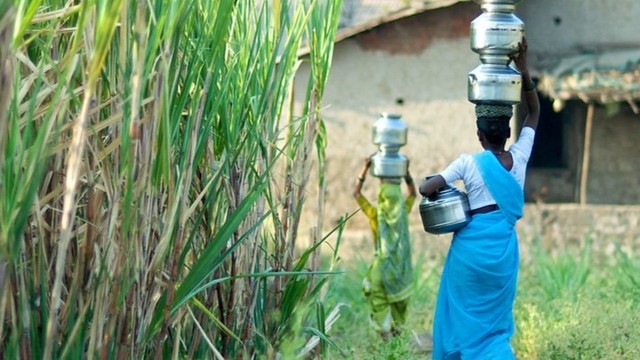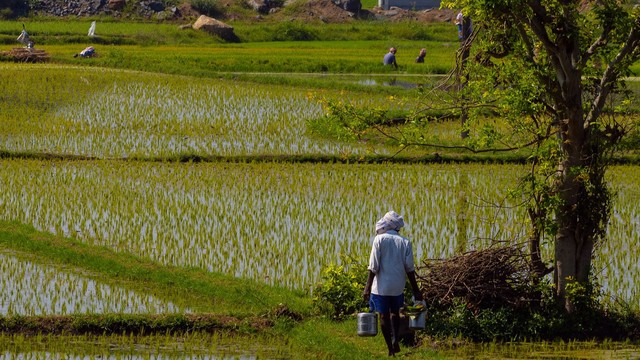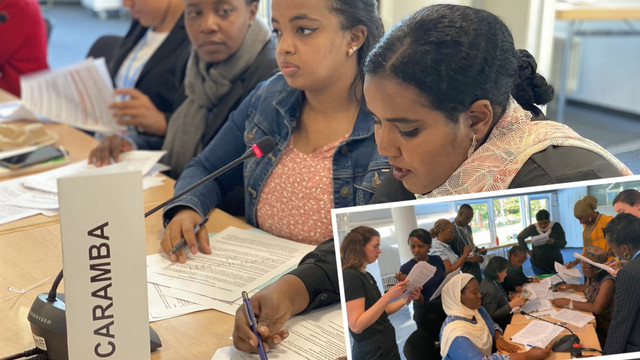On the fast track to climate negotiating: learning from my mentor
Olivier Ishimwe shares how he drew on advice and guidance to maximise his contribution as a junior climate negotiator at COP27.

Junior negotiator Olivier Ishimwe talking to his mentor Yamikani Idriss at COP27, in Sharm el-Sheikh (Photo: Jérémy Davis, IIED)
Looking back at my first COP experience, at COP26 in Glasgow, I was unprepared for the complexity and intensity of these global climate negotiations.
But for COP27 in Sharm el-Sheikh, I was ready. I entered the negotiations with increased knowledge and greater confidence.
This was in large part due to support from my mentor Yamikani Idriss, who I was paired with through a mentorship programme. This programme, coordinated by IIED and WEDO, matches negotiators new to the UNFCCC with senior negotiators from the Least Developed Countries (LDC) Group of climate negotiators. It’s designed to provide skills-building, learning and support, and to improve the abilities, confidence and networks of junior negotiators.
The knowledge Yamikani shared with me was invaluable: bringing me up to speed on all the basics such as how the negotiations are structured – with week one focusing on the technical side, followed by high-level ministerial meetings in the second. He gave me an overview of the UNFCCC processes with its many different workstreams, and helped me get to grips with how the LDC Group operates.
Getting the inside track
Yamikani also shared insider’s tips. His first bit of advice? Maximise your engagement with the LDC Group: make yourself known to its members, look for opportunities to offer support.
If you notice gaps in information being circulated, can you help fill it? Connect with the group’s senior members – do they need any assistance, gathering information on a certain issue within a particular theme, perhaps? Or note-taking for a meeting? As I quickly learnt, coordination meetings at COP are often called spontaneously, so having a willing note-taker at a moment’s notice can be very handy!
Becoming the go-to on Article 6
One big difference about my COP27 experience was being assigned one single negotiation track to focus on. My designated track was Article 6 (PDF) – which is about how countries cooperate to reduce their emissions, including through carbon trading.
I began applying Yamikani’s advice straight away. I was introduced to the LDC’s senior negotiators on Article 6, Sonam Tashi and Gebru Jember – and things progressed quickly from there.
So I got to work: reading as many relevant documents as I could. Every morning I updated the senior negotiators with information on where the Article 6 negotiations and meetings would be taking place.
And the work paid off. Through my updates, members within the LDC Group were getting to know my name.
Distilling key COP outcomes for Rwanda’s youth
You could say that the global climate negotiations have taken on a language of their own – packed full of jargon, acronyms and tricky terms. Keeping pace during the negotiations sessions is hard; communicating COP outcomes to the outside world is harder still.
But it’s vital that the wider public knows what happens at these global summits. How will the decisions reached impact people? For young people – who tomorrow will inherit the decisions made today – this question is more pertinent still.
Relating this to my track at COP27 – what do young people know about Article 6? What do they need to know? How is this relevant to them?
Back in Kigali after COP, I gave a presentation on Article 6 to a group of around 40 young people at an event called the Youth Climate Dialogue. It was organised by The Green Protector in collaboration with The Young Volunteers for the Environment (YVE) Rwanda.
The event was supported by the European Union delegation and the German Embassy in Rwanda.
These dialogues create a space for young people to share and learn from each other on topics related to climate change politics. It’s a forum where youth can share their voices on how to make active contributions to address the climate crisis on a national and international scale.
My presentation started with the basics: ‘what is Article 6?’ and then shared key issues under this track discussed at COP, followed by the main outcomes.
The young people following the discussion were keen to hear more about carbon markets, why they are important and about how countries buy and sell carbon credits. One delegate was particularly interested in the links to the environment: if we, in Rwanda, take on other countries’ greenhouse gas emissions, does this damage the environment?
We also discussed the financial benefits of carbon markets, and how money from carbon trading can support green projects, such as renewable energy projects, in developing countries.
Looking ahead: keeping pace with Article 6
My plan going forward is to stay up to date with progress on Article 6. This will include connecting with my fellow negotiators who follow Article 6, reading new available material and the submissions from different countries on the UNFCCC website. I found understanding the different positions of different groups one of the most challenging aspects of COP – this is an area where I really need to build my knowledge and sharpen my skills.
I will be in regular touch with my national focal point, requesting that I be put forward to become part of the Article 6 review team – tasked with reviewing different reports submitted by countries participating in carbon markets.
And I will, of course, continue engagement with my mentor Yamikani. I’m a member of the ‘New Generation’ platform – a group of junior negotiators from the least developed countries. I caught up recently with my colleague from Nepal Prakriti Koirala on what we learnt in Egypt.
The New Generation group meets weekly, discussing various methods for improving our negotiation skills and topics to help us build our knowledge and skills. Yamikani attends to give advice so we’ll connect on this platform and on a personal level too.
In Sharm el-Sheikh I gratefully experienced, first-hand, how receiving advice and guidance from others can fast-track personal growth and development. But there is still much work to be done! I am now on the path to COP28 − and my learning journey will continue.




